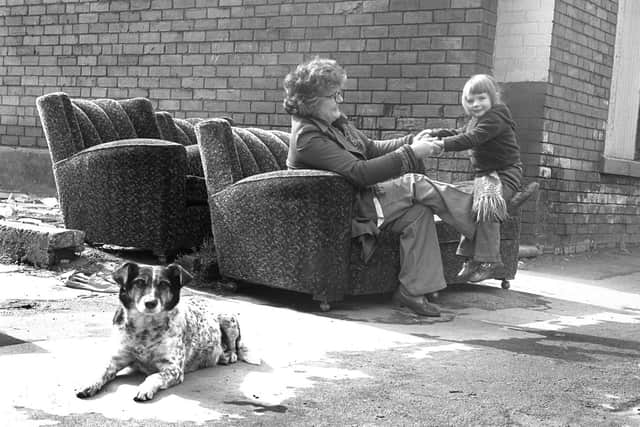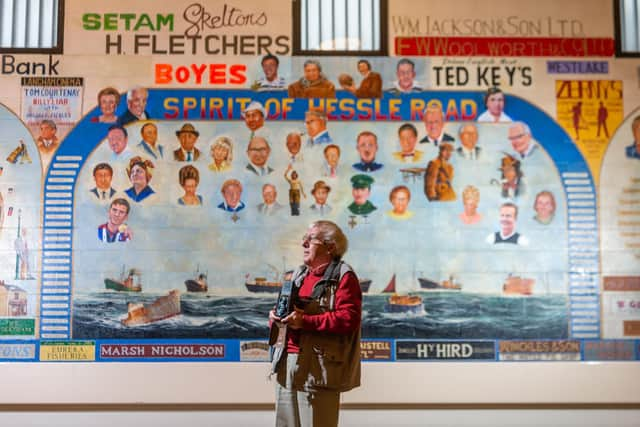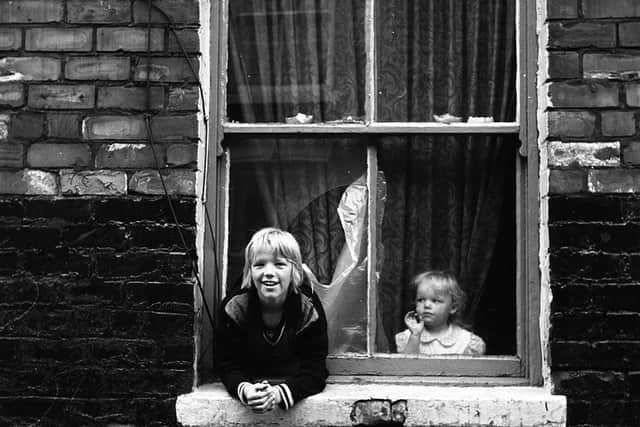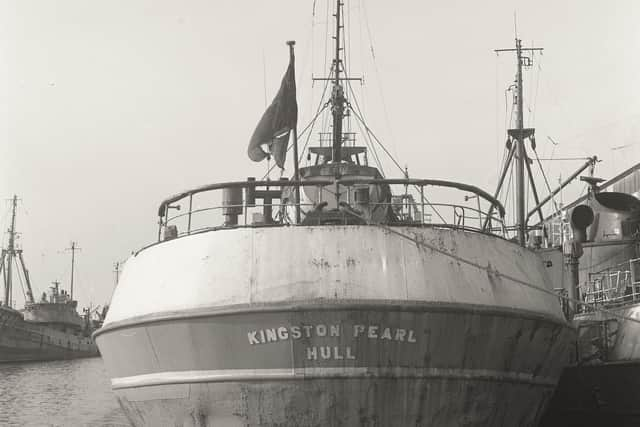The story of Hull's Hessle Road community told in 50 years of remarkable photos
“The Hessle Road area was being demolished, the houses emptied and some people just left unwanted furniture on the street,” he says.
“I didn’t note down the names of these people, but it looks like a granny sitting on an abandoned settee having a ride-a-cock horse game with her granddaughter. The dog is there and seems to balance the image – and added a different dimension. It is looking straight at the camera, as is the girl. It’s just a fun scene that caught my eye, so I clicked this one photo – then moved on.”
Advertisement
Hide AdAdvertisement
Hide AdIt’s 50 years since Alec, then 24 years-old, took his first Hessle Road photo with his trusted second-hand Rolleicord twin-lens reflex camera, which he’d bought the year before for 12 quid.


His lens was trained on Hull’s former fishing community during the 1970s and 80s, and his simple, yet arresting, images capture a pre-digital world where children played games outside, corner shops were on every street and people knew the names of their neighbours.
He has written books in the past and exhibited his work and it was at one such exhibition at the Hull History Centre three years ago that archivist and writer Iranzu Baker came across his work. “When I first saw the images they blew me away, because I’m from Hull and I felt that the city was nearly always presented in a negative light, or we were never in the news for the right reasons, and his photos showed the kind of Hull I think people need to know about,” she says.
Iranzu contacted Alec to see if he was interested in working on a photobook featuring his photos of the ‘Hessle Roaders’ and he agreed. A Kickstarter campaign was launched in September with the aim of raising £17,500 to produce a print run of 500 books and ended up generating more than £22,000.


Advertisement
Hide AdAdvertisement
Hide AdIranzu, who grew up in Hull but now lives in London, will curate, write and edit the self-published book, Alex Gill’s Hessle Road archive, which is due out early next year and will feature around 200 of Alec’s photos. That may sound a lot but is in fact a drop in the ocean (or the Humber Estuary) when you think he’s amassed 6,636 Hessle Road images (of which he’s digitised more than 2,000).
“The fishing industry is such a huge part of our culture and we mustn’t forget that and these images help tell this story and capture an important part of our city’s past,” Iranzu says. “The last 18 months have shown us how important that feeling of togetherness is, so it feels like a nice time to put this project out into the world, because it is essentially about people forming a community.”
Alec used a notebook to record the time, date and location of each photo and though his pictures focus on a specific community the scenes that played out were reflected in the streets of Bradford, Leeds, Halifax and just about every other industrial town and city.
Before he started photographing Hull’s fishing community, Alec had already been honing his craft on his travels hitchhiking to places like Israel, Italy, Cyprus and Northern Ireland.


Advertisement
Hide AdAdvertisement
Hide AdIt was in 1974, while studying psychology at Hull University as a mature student, that he came up with the idea of creating a kind of visual record of life among the Hessle Roaders, after something one of his lecturers said.
“Professor Clarke told the class one day, ‘if you want to get on in life, you’ve got to specialise.’ He was talking about psychology but that made me think about the places I’d been and photographed. I’d taken a good picture in Sicily of some fishermen repairing their nets and I thought ‘why am I photographing fishermen in Sicily when I come from a fishing port?’ So I thought I’d specialise in the communities of Hessle Road.
“There was something else he said that I thought was interesting. He compared middle class kids with working class kids and he said middle class kids usually have gardens and books, whereas working class kids only have the freedom of the streets and that gave me the idea of a theme within a theme. So I started photographing the kids on the streets there, too. And having grown up myself among the bombed out building sites of Hull I had this affinity with them.”
Alec doesn’t regard himself as a photographer as such, more “a psychologist with a camera”, as he puts it.


Advertisement
Hide AdAdvertisement
Hide Ad“There are a lot of good photographers and they photograph buildings rather than people. But I’d see a scene and wait for someone to come along. Whereas a lot of photographers seem to wait for people to go. For me, people give a picture life and context.”
He was born and raised in Hull’s old town area and though he wasn’t from a fishing family his dad worked on the cargo ships and he says he felt a kinship with the close-knit community he got to know and understand.
“I’m on the small side and I had an affinity with the Hessle Roaders in the sense of being an underdog. And the Hessle Roaders were the underdogs – they were the underdogs on the fish dock because the trawler barons ran the dock a bit like a feudal system.
"If you were a skipper and you got out of line then they’d let you know about it and you wouldn’t get another ship in Hull. And within the city itself there was this social snobbery towards Hessle Road, there was the drunken, brawling fisherman and the screaming fishwife stereotypes. So I was drawn to them as a subject,” he says.
Advertisement
Hide AdAdvertisement
Hide Ad“Having gone to university from a working class background as a mature student and having been born in the old town, it just removed me slightly from the community to do a documentary study.”
And did they accept him? “I like to think so. I got to know them, people like skipper Dicky Taylor. I sailed with him on the Cordella taking photographs of the crew.”
Photographic archives like Alec’s are rare, but he dedicated so much time to it because of his passion for the craft. “I was doing street photography before the term was coined. But I didn’t do it to make money. I’ve never received any grants. I’ve always done it out of my own pocket,” he says.
Sir Tom Courtenay has described Alec as “a chronicler of Hessle Road”, while the former poet laureate Sir Andrew Motion was equally impressed. “He came to see my exhibition and we had quite a good chat and he said to me ‘your photographs look as if there’s no photographer present’. Well, that’s a great complement.”
Advertisement
Hide AdAdvertisement
Hide AdAlec himself views his photographs as a documentation of life as it used to be. “They coincided with the decline of the fishing industry and the demolition of the Hessle Road fishing community’s terrace houses. And looking at the photographs now is like looking back through a time machine... You just wonder where the time goes,” he adds.
Alec Gill’s Hessle Road archive comes out in spring next year and can be pre-ordered via this online link http://alecgillhessleroadphotoarchivebook.com/
